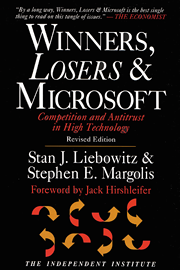Friday was a great day for consumers, but not for the reasons that Janet Reno had in mind when she touted her first-round victory in the Microsoft case. It was a great day for consumers because millions of them used capable and affordable computers to solve problems, purchase products, communicate with friends and family, gather medical information and do millions of other amazing tasks. But the Findings of Fact made it a bad day for tomorrow’s consumers, who may well be in for a slowing of the amazing progress in personal computing.
Consumers, along with hundreds of thousands of software-industry employees, have benefited enormously from Microsoft’s efforts to establish, maintain and improve a standard platform for personal computing. (In this market, where consumers value compatibility, it is both likely and desirable that a large fraction of consumers would choose to use the same computing platform.)
A central issue in the Microsoft case has been Microsoft’s decision to improve their operating system by incorporating Internet Explorer, their web browser. The government has litigated this case largely on behalf of Netscape, taking the position that new features should not be added to the operating system if that action hurts a rival. But if successful firms will now be hamstrung in their efforts to keep their technologies current, products will stagnate. Future users and producers of computers and software will be harmed.
The Findings of Fact barely mention any consumer harm from Microsoft’s actions. The judge does not argue that Microsoft charges monopoly prices. He concedes that Microsoft’s browser has improved the breed. He offers only vague speculations about rather trivial consumer harms. Those alleged harms ought to be weighed against potential damage to one of the country’s most vital and progressive industries if companies’ freedom to improve their products is impaired.
The real harm of monopoly is high prices and restricted outputs. Microsoft’s influence has been to lower software prices. This is documented in my book with Stan Liebowitz, cited below. From 1985 to 1995, in five categories of software applications where Microsoft does not compete, prices fell by 15%. In the same period, in ten categories of applications where Microsoft does compete, prices fell by 65%. We also document that Microsoft has improved the breed in many applications markets, not just browsers. These real benefits–falling prices and improving quality–may well be lost in the future if the DoJ breaks up Microsoft or imposes tight regulation of the industry.
Antitrust ought to serve consumers, not particular competitors. If the government wants to pick winners and losers, it ought to look out for the millions of computer users and computer-industry employees. Let them be the winners.









